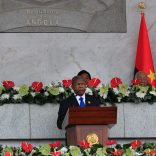Brazil opens probe into Anglo American's $500 million nickel sale, FT reports
Cabo Verde: Price hikes make cooking oil almost a luxury – report

FILE PHOTO - For illustration purposes only. [File photo: Lusa]
The rise in prices in Cabo Verde is being felt in almost all activities, but more markedly in food, where even frying fish has become more expensive and pork fat is replacing oil.
Aisha Silva, 25, is an example of Cabo Verdeans affected by the price increases in recent weeks in food products on the markets in Cabo Verde, whether by the continuous increase in energy prices, transport and now by the consequences of the war in Ukraine throughout the distribution chain.
“Even frying a fish in Cabo Verde has become more expensive. Oil has become a rare product and for the few,” said Aisha Silva, a domestic worker in Praia who Lusa found shopping at the Plateau market in the centre of the Cabo Verdean capital.
Going to the market to do the shopping for the month, or now for the week, is an everyday situation, but one that in recent months has been testing the family budget of Cabo Verdeans. These difficulties are shared by Sandra Lopes, 40, who works as a domestic worker and street vendor in Praia. She complains about the “exorbitant rise” in food prices.
“Previously, 5,000 escudos [€45] was enough to feed the family, but now not even 15,000 escudos [€135, practically the minimum wage in the country] is enough to make a purchase that lasts up to half the month,” she complained on a trip to the market in the capital.
Among the difficulties in everyday life, still affected by the economic crisis caused by the Covid-19 pandemic, she bluntly points to the rise in prices, starting with oil, which has soared more than 50% since the beginning of the month and is now being sold in Cabo Verde for 350 escudos (€3.15) a litre.
This is a price that Sandra Lopes says she cannot afford, so she has opted to replace it with “pork fat”, which is “cheaper and stretches further” for a large family, including, in her case, children and grandchildren.
“I can’t spend 300 escudos on the oil. How am I going to buy the fish?
From crisis to crisis, some believe that the price rises directly reflect the war caused by Russia’s invasion of Ukraine and the pandemic. This is the case of Ermelindo Sanches, 55, who spoke to Lusa in the centre of Plateau, near the capital’s market, who said that the regulators should “act” to curb price speculation.
As “things are”, he confesses that he has no other solution than to live with a “tight hand” and save on some purchases.
“It’s not just me. It’s everyone,” he complained, worried about the coming times, which keep Cape Verde in crisis.
The government of Cabo Verde has set up a crisis cabinet to analyse price increases in the country and define measures to reduce the impact of the crisis on families, Prime Minister Ulisses Correia e Silva announced on Friday.
According to the head of government, the decision was taken at a cabinet meeting after analysing the international situation and the impacts on Cabo Verde.
“Due to the consequences of the war in Ukraine, Covid-19, and the drought that Cabo Verde is going through,” he said.
Ulisses Correia e Silva added that the crisis cabinet “will have the mission to analyse all the scenarios of the increase in prices of products,” as well as “design the measures that should be implemented in the country, to reduce the impact of this increase on the lives of families.”
“Soon, I should announce the measures,” he said.
He gave assurances that the government was “attentive” to the “exponential rise in prices on all products” but added that the country imports “almost everything” that it consumes, which has to be transported to the archipelago.
“While Covid-19 caused an international price increase, where transport increased fourfold, now, because of the war, this same price has increased three times more, that is, if it was two, it has become six,” he explained.
Prices in Cabo Verde rose by 0.7% in February and 7.1% compared to the same month of 2021, according to the latest figures from the Cabo Verdean National Statistics Institute (INE).
In recent weeks, these generalised increases in Cabo Verde are most visible in basic food products, such as bread or oil.
According to new maximum values defined by the sector’s regulatory agency, the average fuel price has risen by more than 4% this month in Cabo Verde.
Electricity tariffs, which are also affected by fuel prices – Cabo Verde depends on diesel power plants for electricity production – increased by an average of 30% last October.












Leave a Reply
Be the First to Comment!
You must be logged in to post a comment.
You must be logged in to post a comment.